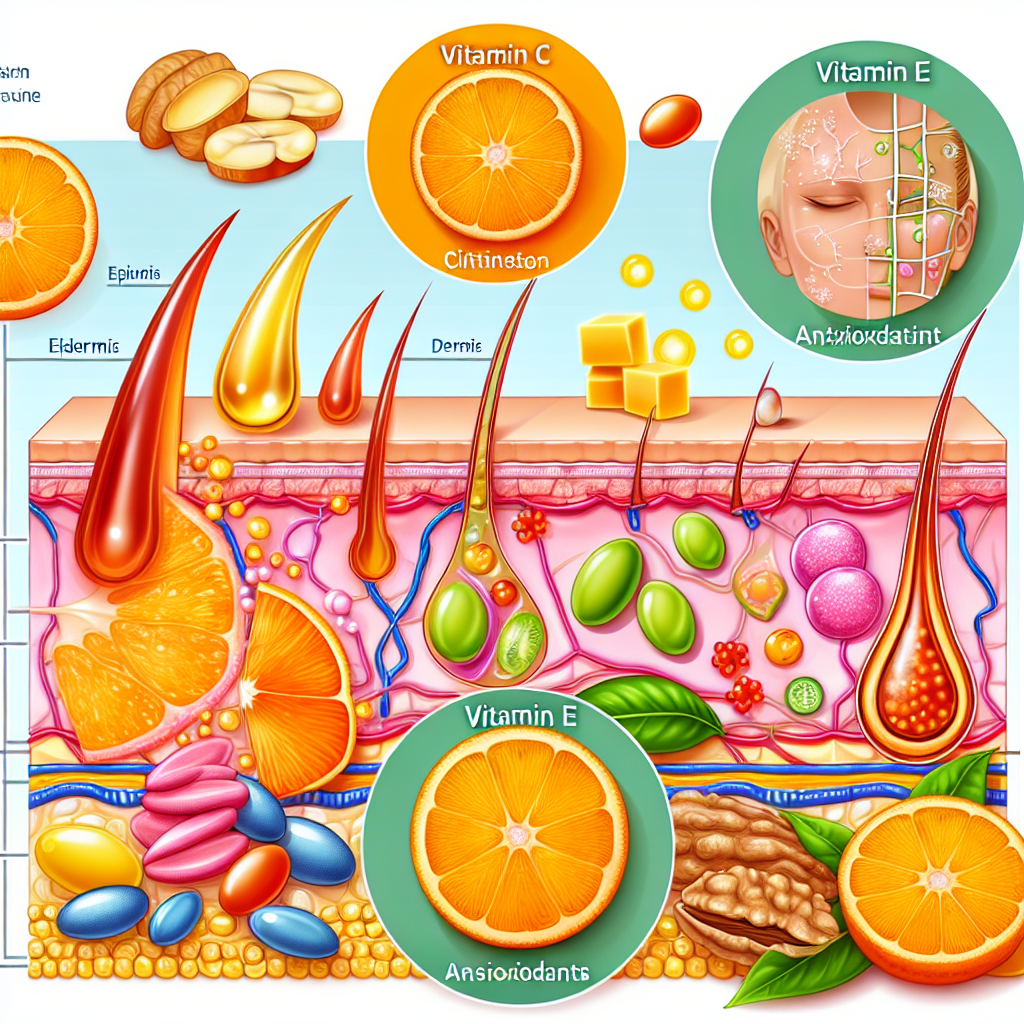How Vitamin C and E Keep Your Skin Glowing

Discover the secret to glowing skin with Vitamins C and E! Learn how these essential nutrients can enhance your skin’s health and give you that radiant glow you’ve always wanted. Don’t wait, start your journey to vibrant skin today. Click here to find out more.
The Role of Vitamin C and E in Achieving Radiant Skin
The quest for radiant, glowing skin is a journey that many embark on, but few truly understand the science behind achieving this coveted glow. The secret to radiant skin lies not only in the products we apply topically but also in the nutrients we consume. Among these nutrients, vitamins C and E play a pivotal role in maintaining and enhancing the health and glow of our skin.
Vitamin C, also known as ascorbic acid, is a potent antioxidant that is crucial for the health of our skin. It plays a significant role in collagen synthesis, a process that helps maintain the skin’s elasticity and firmness. As we age, our skin’s natural collagen production decreases, leading to the formation of wrinkles and fine lines. By boosting collagen production, vitamin C helps to combat these signs of aging, promoting a youthful and radiant complexion.
Moreover, vitamin C is renowned for its ability to brighten the skin. It inhibits the enzyme tyrosinase, which is responsible for converting tyrosine into melanin, the pigment that gives our skin its color. By inhibiting this enzyme, vitamin C helps to reduce hyperpigmentation and dark spots, resulting in a more even and radiant skin tone.
On the other hand, vitamin E, also known as tocopherol, is another powerful antioxidant that protects the skin from damage caused by free radicals. Free radicals are unstable molecules that can damage the skin cells, leading to premature aging and dullness. Vitamin E neutralizes these free radicals, preventing them from causing harm to the skin.
In addition to its antioxidant properties, vitamin E also has moisturizing and healing benefits. It strengthens the skin’s barrier function, helping to lock in moisture and keep the skin hydrated. This is particularly beneficial for those with dry skin, as it helps to prevent flakiness and roughness, contributing to a smoother and more radiant complexion. Furthermore, vitamin E accelerates the skin’s healing process, helping to repair damaged skin and reduce the appearance of scars.
When combined, vitamins C and E create a powerful duo that can significantly enhance the health and radiance of the skin. They work synergistically to provide even more potent antioxidant protection, with vitamin C regenerating oxidized vitamin E, thereby enhancing its effectiveness. This combination not only helps to prevent and repair skin damage but also boosts the skin’s brightness and elasticity, leading to a more youthful and glowing complexion.
In conclusion, vitamins C and E play a crucial role in achieving radiant skin. They protect the skin from damage, boost collagen production, brighten the skin tone, and provide moisturizing and healing benefits. By incorporating these vitamins into your skincare routine and diet, you can enhance the health and glow of your skin. However, it’s important to remember that while these vitamins can significantly improve your skin’s appearance, they should be used as part of a comprehensive skincare routine that includes regular cleansing, exfoliation, and sun protection. With the right care and nutrients, radiant, glowing skin can be more than just a dream—it can be a reality.
Unlocking the Secrets of Glowing Skin: The Power of Vitamins C and E

Unlocking the secrets of glowing skin is a quest that many embark on, but few truly master. The key, as it turns out, lies not in expensive creams or invasive procedures, but in the humble realm of vitamins. Specifically, vitamins C and E have been found to possess remarkable skin-enhancing properties. These two vitamins, when used correctly, can help you achieve the radiant, youthful skin you’ve always desired.
Vitamin C, also known as ascorbic acid, is a potent antioxidant that plays a crucial role in maintaining skin health. It is essential for the synthesis of collagen, a protein that provides structure and elasticity to the skin. As we age, our skin’s collagen production naturally decreases, leading to wrinkles and sagging. By boosting collagen production, vitamin C helps to combat these signs of aging, promoting a firmer, smoother complexion.
Moreover, vitamin C has been shown to help reduce the appearance of hyperpigmentation and dark spots. It does this by inhibiting the enzyme tyrosinase, which is responsible for melanin production. By reducing melanin production, vitamin C can help to even out skin tone and enhance skin radiance.
But the benefits of vitamin C don’t stop there. This powerful antioxidant also helps to protect the skin from damage caused by harmful free radicals and UV radiation. By neutralizing these damaging molecules, vitamin C helps to prevent premature aging and maintain skin health.
On the other hand, vitamin E, also known as tocopherol, is another antioxidant that works synergistically with vitamin C to enhance its effects. Like vitamin C, vitamin E helps to protect the skin from damage caused by free radicals and UV radiation. However, it also has some unique benefits of its own.
Vitamin E is known for its moisturizing properties. It helps to strengthen the skin’s barrier function, preventing moisture loss and keeping the skin hydrated. This results in softer, smoother skin with a healthy glow. Additionally, vitamin E has been found to help reduce inflammation and redness, promoting an even skin tone.
Furthermore, when used together, vitamins C and E have been found to provide even greater skin benefits. Research has shown that the combination of these two vitamins provides superior protection against UV damage compared to either vitamin alone. This is because vitamin E helps to regenerate vitamin C, enhancing its antioxidant activity and boosting its skin-protecting effects.
In conclusion, vitamins C and E are powerful allies in the quest for glowing skin. They help to boost collagen production, reduce hyperpigmentation, protect against free radical and UV damage, and keep the skin hydrated. By incorporating these vitamins into your skincare routine, you can unlock the secret to radiant, youthful skin.
However, it’s important to remember that while these vitamins can provide significant skin benefits, they are not a substitute for a healthy lifestyle. Regular exercise, a balanced diet, adequate sleep, and proper hydration are all essential for maintaining skin health. So, while you explore the power of vitamins C and E, don’t forget to take care of your overall health as well. After all, true beauty comes from within.
How Vitamins C and E Contribute to a Healthy, Glowing Complexion
Vitamin C and E are two essential nutrients that play a significant role in maintaining a healthy, glowing complexion. These vitamins are potent antioxidants that protect the skin from harmful free radicals, promote collagen production, and help to repair damaged skin cells.
Vitamin C, also known as ascorbic acid, is a water-soluble vitamin that is crucial for the synthesis of collagen, a protein that gives the skin its firmness and elasticity. As we age, our skin’s natural collagen production decreases, leading to the formation of wrinkles and fine lines. By boosting collagen production, vitamin C helps to maintain the skin’s youthful appearance and reduce the signs of aging.
Moreover, vitamin C is a powerful antioxidant that protects the skin from the damaging effects of free radicals. Free radicals are unstable molecules that can cause oxidative stress, leading to premature aging and various skin disorders. By neutralizing these harmful molecules, vitamin C helps to prevent skin damage and maintain a healthy, glowing complexion.
In addition to its antioxidant properties, vitamin C also plays a crucial role in skin brightening. It inhibits the enzyme tyrosinase, which is responsible for the production of melanin, the pigment that gives the skin its color. By reducing melanin production, vitamin C helps to lighten hyperpigmentation and dark spots, resulting in a more even skin tone.
On the other hand, vitamin E, also known as tocopherol, is a fat-soluble vitamin that is renowned for its moisturizing and healing properties. It helps to strengthen the skin barrier, lock in moisture, and keep the skin hydrated and plump.
Like vitamin C, vitamin E is also a potent antioxidant that protects the skin from free radicals. However, it is particularly effective in combating the harmful effects of UV radiation. Exposure to UV rays can cause sunburn, premature aging, and even skin cancer. By absorbing these harmful rays, vitamin E helps to prevent sun damage and maintain the skin’s health and vitality.
Furthermore, vitamin E has anti-inflammatory properties that help to soothe and calm irritated skin. It is often used in skincare products to treat conditions like eczema and psoriasis. By reducing inflammation, vitamin E helps to improve the skin’s texture and appearance, contributing to a healthy, glowing complexion.
In conclusion, vitamins C and E are essential for maintaining a healthy, glowing complexion. They protect the skin from free radicals, boost collagen production, and help to repair damaged skin cells. Moreover, they have brightening and moisturizing properties that contribute to the skin’s overall health and appearance. Therefore, incorporating these vitamins into your skincare routine can significantly improve your skin’s health and give you that coveted glow.
However, it’s important to remember that while these vitamins can provide numerous benefits for the skin, they are not a substitute for a healthy lifestyle and a balanced diet. Regular exercise, adequate sleep, and a diet rich in fruits and vegetables are also crucial for maintaining a healthy, glowing complexion. So, while you nourish your skin with vitamins C and E, don’t forget to nourish your body from the inside out.